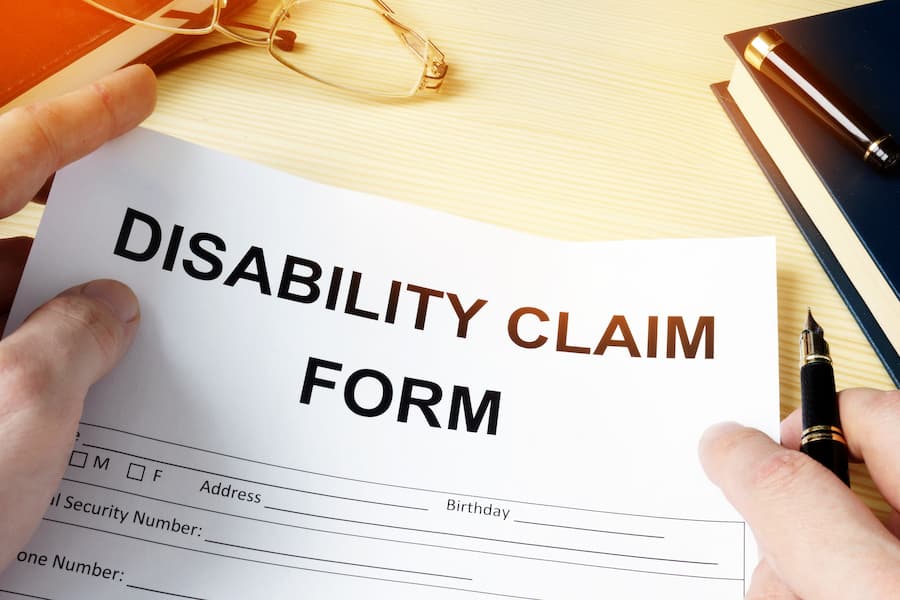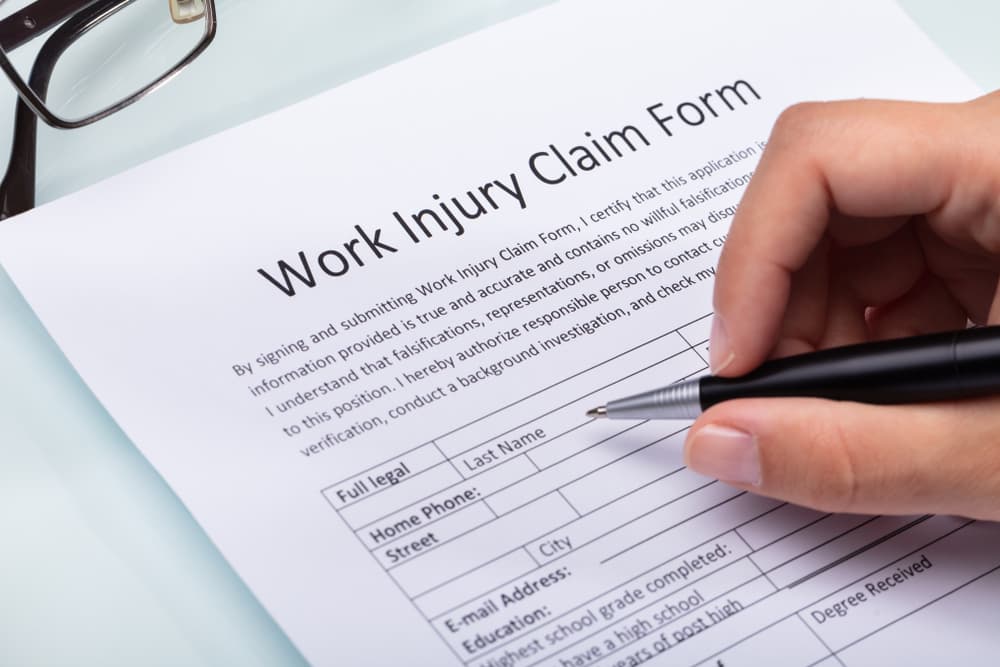Suffering an injury while at work can affect your well-being and ability to return to your job as soon as possible. Navigating your injuries and the impacts of a work injury can leave you facing mounting stresses and challenges that arise as you wait to resolve a workers' compensation claim.
Errors, omissions, or misunderstandings during the complex workers' compensation claims process can cause delays in the claim or the amount of compensation you may receive. Disability determinations, in particular, can significantly affect the amount of money you may receive as part of a workers' compensation claim payout. The designation as a permanent partial disability can influence how your claim proceeds and how long you may receive benefits.
Consulting a workers' compensation attorney allows you to discuss your claim and what you can expect in your case.
What is Workers' Compensation?
Workers' compensation is a system of insurance that provides wage replacement and medical benefits to employees who are injured or become ill due to their work. It is a form of social insurance meant to protect both employees and employers.
Key aspects of workers' compensation include:
- Wage Replacement: If an employee is unable to work due to a work-related injury or illness, workers' compensation provides financial compensation to replace lost wages.
- Medical Benefits: Workers' compensation covers the cost of medical treatment related to the injury or illness. This can include medical bills such as doctor visits, hospital stays, medication, rehabilitation, and other necessary medical services.
- Disability Benefits: If an injury or illness causes temporary or permanent disability, workers' compensation may provide disability benefits to compensate for lost earning capacity.
- Death Benefits: In the unfortunate event that a work-related injury or illness leads to death, workers' compensation may provide benefits to the deceased employee's dependents to help cover funeral expenses and provide financial support.
- Legal Protection: Workers' compensation typically includes legal protections for both employees and employers. Employees who receive workers' compensation benefits generally cannot sue their employer for damages related to the injury or illness, except in cases of extreme negligence or intentional harm. Similarly, employers are protected from most lawsuits by employees injured on the job.
The overall goal of workers' compensation is to ensure that employees receive necessary support and compensation when they are injured or become ill as a result of their work, while also providing employers with a predictable system for managing workplace injuries and minimizing litigation.
Who Must Provide Benefits for Workers in South Carolina?
In South Carolina, as in many other states, employers are generally required to provide workers' compensation insurance coverage for their employees. In our state, this program is overseen by the South Carolina Workers' Compensation Commission.
The South Carolina Workers' Compensation Act mandates that most employers with four or more employees must carry workers' compensation insurance. However, there are some exceptions and nuances:
- Sole Proprietors and Partners: Sole proprietors and partners are not automatically covered under workers' compensation insurance unless they elect to be included in their own coverage.
- Agricultural Employers: Agricultural employers with fewer than ten regular employees who work for the same employer for more than 35 hours per week are exempt from providing workers' compensation coverage. However, they can choose to provide coverage voluntarily.
- Casual Employees: Employers with fewer than four employees or with an annual payroll under $3,000 for the preceding year are not required to provide workers' compensation coverage for casual employees, such as occasional part-time workers.
- Railroad and Maritime Workers: Workers in the railroad and maritime industries are typically covered under federal workers' compensation laws rather than state laws.
Who Can File a Workers’ Comp Claim?

Injured victims don't always know if they can file a claim for workers' compensation benefits, or how to. If you suffer an injury at work or executing work duties but not at your place of employment, you likely have grounds to file a worker's compensation claim with your employer's coverage.
Workers' compensation insurance allows employers to avoid liability through legal action in most instances. The insurance coverage also allows workplace injury victims to pursue benefits without the need to prove negligence or fault for the accident.
If you suffer any injury or occupational disease that affects your ability to work and causes you to incur medical expenses, you can seek coverage through a worker's compensation insurance claim. When you suffer an injury while on the job, speak to a workers' compensation attorney about your injuries and possible disabilities arising from the workplace accident and whether you qualify for a permanent partial disability benefit.
What Is the Difference Between a Temporary, Total, and Partial Disability?
Not all disabilities incur the same impacts or available compensation in a worker's compensation claim. There is a differentiation between the type of disability that occurs to workers when they suffer an injury on the job. A temporary, total, or partial disability can affect the percentage of the compensation you may be eligible to receive and the length of time you can receive benefits.
A Temporary Disability
There are two categories of temporary disability benefits: temporary total disability and temporary partial disability. Both provide lost wages while you recover from your injuries resulting from an on-the-job injury or illness.
A temporary total disability is when you sustain an injury and cannot work at all during your recovery. In most cases, workers suffer a temporary partial disability when they sustain injuries on the job. A temporary disability causes impairment and restricts a worker's ability to work. However, the impacts are only temporary as the worker recovers.
With a temporary disability, the benefits sought by an injured worker are temporary, and the worker expects to recover fully from their injuries and eventually will be able to return to work at full capacity.
A Total Disability
A disability classified as a total disability restricts an individual from returning to work in any capacity. A permanent total disability causes permanent limitations for an injured employee, preventing them from carrying out any work duties. This does not mean solely in the prior position but in any work capacity. A permanent total disability commonly occurs when a worker suffers catastrophic injuries in a work accident affecting their ability to function and live normally.
A Permanent and Partial Disability
When an individual's injuries lead to a permanent partial disability, it is a disability that may not completely prevent an individual from working but restricts their ability to return to the line of work or position they were in before the accident. A permanent partial disability is an injury that causes limitations for an individual to carry out specific work duties.
However, they may still be able to find other ways to earn a living. A partial disability designation allows a worker to receive partial benefits for the impacts on their earnings because of the challenges created by their injury. A partial disability is permanent, and there is no expectation that the injured worker will fully recover and regain the functions lost in the accident.
You may not be sure how your injuries may affect your future and your continued ability to work. Consult with a workers' compensation attorney for help in determining if you have a disability and if you may qualify for permanent disability benefits in a claim under workers' compensation coverage.
How Can the Designation of Your Permanent Partial Disability Status Affect a Workers’ Compensation Claim?
Determining the amount of money you can receive for permanent partial disability benefits is a complicated process. When filing a claim, the type of injury you sustain and the severity of the injury can influence the percentage of the compensation you receive.
Typically, during the claim, the insurer may provide a rating based on a doctor's diagnosis about the injury you sustained and how it affects your ability to function. This may include a determination of whether you have reached your maximum medical improvement or MMI.
Maximum medical improvement means that you have recovered from your injury as much as possible and likely won't improve with any additional medical treatment. When a doctor determines that you have reached maximum medical improvement, they will issue an impairment rating along with any future work restrictions and recommend future medical treatments that might help you maintain your level of functioning.
A disability rating that does not accurately reflect the type of injury you sustained can reduce your medical benefits. A workers' compensation attorney can ensure the insurance company has the documentation necessary to prove the extent of your injuries.
How Can You Prove You Have a Disability in a Workers’ Compensation Case?
Although the advantage of a workers' compensation claim is that you do not need to prove fault, you must still prove how your injuries affect your ability to work, currently and in the future.
You need documentation and medical evidence to win a workers' compensation claim, and any missing information can cause delays, a denial, or less compensation for your injuries than what you may deserve. Hiring a lawyer to help you prepare and file a challenging and tedious workers' compensation claim will avoid common mistakes that can hurt your case and prevent you from getting access to the money you need after a workplace accident.
Should You Hire a Lawyer for Your Workers’ Compensation Claim?
Often, workers injured on the job can feel a false sense of security when filing a claim for their injuries. You may believe that your employer and the insurance representative in charge of your workers' compensation claim have your best interests at heart. While they may act cordial and concerned, these parties are competing interests in your claim, and their priority is to protect their own interests.
By hiring a lawyer, you can rest assured that your needs and rights are not an afterthought or overlooked by the parties involved. Your lawyer can help you ensure the claim for your injuries is accurate when filed and can remain in contact with the insurer and parties involved throughout the process, which can take time until reaching a resolution or approval of payment for benefits.
How Much Compensation Might You Be Eligible for in a Workers’ Compensation Claim?
The amount of money you can receive in a permanent partial disability workers' compensation claim will depend on various factors, including the classification of your injuries and severity. Your doctor's diagnosis and the rating of your injury can play a big part in how much money you may receive in payments for your disability. Other factors that the insurer can consider are the work you can do in light of your injuries and the amount of money you can earn compared to your income before the workplace accident.
If you are granted temporary total disability benefits, you will receive 66.6 percent of your average weekly wage based on the four quarters before your injury, not to exceed the average weekly wage as determined by the South Carolina Department of Employment and Workforce.
However, if you are an injured worker with a permanent partial disability, you can expect that you will not receive 100 percent of your compensation as you can still earn a living in some capacity. However, you are likely eligible to receive benefit payments based on the seriousness of your injury and how it limits your ability to work now and in the future.
Benefits for a workers' compensation claim for partial permanent disability include money to cover your medical expenses and a portion of your lost wages in consideration of your injuries.
What Timeline Can You Expect for Payment on a Work Comp Claim?
When you begin filing a workers' compensation claim, you will want to know when you can expect to receive benefit payments. It is crucial to understand that the worker's compensation claims process is anything but quick; however, the benefit to you, in the long run, is more than worth the trouble of filing and pursuing a claim.
In some cases, an individual may see their first benefit payments in a matter of weeks; however, more commonly, it can take many months for the claims process to complete its investigation and offer payment of your benefits through the insurance coverage.
As you prepare to begin the workers' compensation claim, you should speak with your lawyer to go over the most expected timeline based on your case's facts. Knowing how long it can take to begin receiving benefit payments can help you make the necessary arrangements and manage your day-to-day responsibilities and expenses as you await a resolution of the claim.
What Can You Do if Your Workers’ Comp Claim Is Denied?
Unfortunately, workers' compensation claims happen, and if they do, you are not automatically out of options. If you have not spoken to a lawyer about your claim, you must immediately contact one if you receive notice of a denial of a workers' compensation claim.
Although it is always better to call a worker's compensation lawyer immediately after a workplace injury, a lawyer may still be able to provide you with support and guidance in light of a claim denial.
A lawyer can evaluate the documentation of your injuries and workplace accident and the underlying reasons for the denial of the claim to help determine if they can assist you in seeking reconsideration or appeal of your claim.
Time Limits to Keep In Mind When Filing a Workers’ Comp Claim
There are time restrictions for a worker injured on the job to file a workers' compensation claim lawsuit under the law. The amount of time in favor of a plaintiff in a workers' compensation claim differs depending on the accident's jurisdiction.
Beyond the statute of limitations under the law to take legal action on a workers' compensation claim, an insurer has its timeframes for when a victim must notify them of an injury occurring on the job. The best approach as an injured worker is to contact a lawyer soon after you incur an injury to get guidance on what steps to take to protect your legal rights.
How Can a Lawyer Help You With a Claim for Injuries Sustained While on the Job?

A lawyer should not be your last resort and only a consideration if you run into trouble with a workers' compensation claim. Contact a lawyer at the outset of your injuries. Before you speak to an insurance company about your injuries and file a claim, contact a workers' compensation attorney. Reach out to a personal injury lawyer.
Your lawyer can help you access the evidence and documentation you need, can help you get access to the right doctors, and can help manage the parties involved, including the insurance company, to make sure that you stay up to date on information requests and developments that may arise during your claim.








